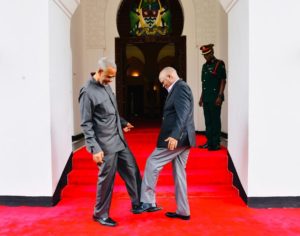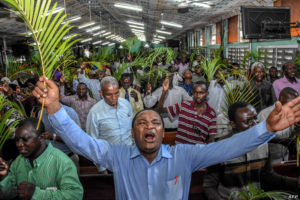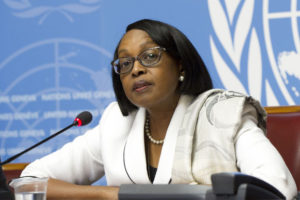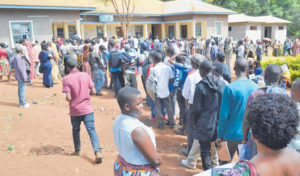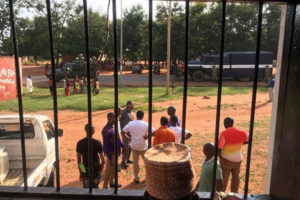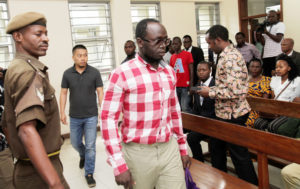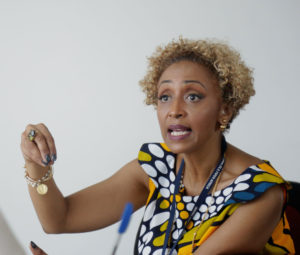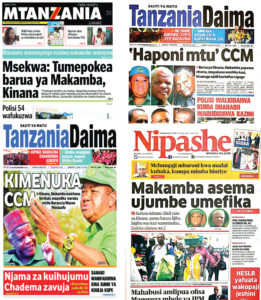Ben Taylor
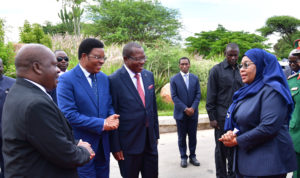
Left to Right – Speaker Job Ndugai, Prime Minister Kassim Majaliwa, Vice President Dr. Philip Mpango and President Samia Suluhu Hassan (Ikulu).
President Samia Suluhu Hassan was sworn into office as President on March 19th, 2021. She becomes Tanzania’s sixth President and the country’s first female President. She will serve the remainder of President Magufuli’s second term to 2025, and under the Constitution will be eligible to run for one further five-year term.
“Today I have taken an oath different from the rest that I have taken in my career,” she said. “Those were taken in happiness. Today I took the highest oath of office in mourning.”
The symbolism of having a female, hijab-wearing head of state was widely noted at the time of her swearing-in, with observers noting also the prominent all-female front line of military band drummers that danced their way through the parade, and spotting that the aide-decamp standing close throughout the process was also a woman.
President Hassan is also the country’s first president born in Zanzibar – in Makunduchi, in January 1960. (President Mwinyi was also Zanzibari, but born on the mainland.) She completed her secondary education in 1977 and began her career as a clerk at Zanzibar’s Ministry of Planning and Development. The following year she married Hafidh Ameir, an agricultural officer, now retired, with whom she has four children. She pursued a number of short-courses on a part-time basis, before graduating in 1986 from the Institute of Development Management (present-day Mzumbe University) with an advanced diploma in public administration. Between 1992 and 1994, she attended the University of Manchester, UK, and earned a postgraduate diploma in economics, and in 2015, she obtained an MSc in Community Economic Development via a joint-programme between the Open University of Tanzania and the Southern New Hampshire University.
After spells with the World Food Programme and Action Aid, she turned to politics in 2000. She was elected as a special seats member of the Zanzibar House of Representatives and was appointed a minister by President Amani Karume, the only high-ranking woman minister in the cabinet. In 2010, she sought election to parliament, winning the Makunduchi seat comfortably. President Kikwete appointed her as Minister of State for Union Affairs, and in 2014, she served as Vice Chair of the Constituent Assembly tasked with drafting the country’s new constitution.
President Hassan takes office without her political views and personality having previous been widely known. Before her selection as the CCM vice-presidential candidate in 2015 she had been a relatively obscure figure on the national political stage, and as Vice President she had largely aligned herself behind the President, though she showed an independent streak in choosing to visit opposition leader Tundu Lissu in hospital after an assassination attempt, against the President’s wishes.
January Makamba – himself a former (and likely future) presidential aspirant – described her as “the most underrated politician in the country”. And since taking office, she has demonstrated considerable dynamism and skill in negotiating a potentially difficult transition. In a series of speeches, appointments and pronouncements, she managed both to reassure supporters of the former President that she would continue to follow the path he laid down and to indicate to his critics that her approach would be different in significant ways.
In several closely watches speeches shortly after taking office she gave a sense of her direction as President, taking actions and laying out a long list of pledges and priorities. In combination, these speeches signalled three major changes of direction compared to her predecessor.
First, and most prominently, she showed her intention to improve the environment for business and foreign investment. She directed the Tanzania Revenue Authority (TRA) to stop frustrating businesses by milking them dry and instead look for new ways on how to expand the tax base. “Using a lot of force in collection of tax, closing taxpayers’ bank accounts, forcefully taking money from their accounts, just because the law allows you to do so, is unacceptable,” she stated. For similar reasons, she directed the immigration authorities to stop frustrating investors by limiting number of non-Tanzanian staff. And she directed Ministers find a lasting solution to the bureaucracy on tax matters that was frustrating investors, saying it was disheartening that VAT refunds were not being made as required. (See also Economics section in this issue.)
Second, she signalled a more open and pro-democratic approach to politics. She directed the Information Ministry to lift bans imposed on some media outlets, and announced her intention to meet with opposition leaders to resolve disagreements about the political environment. She directed the corruption watchdog (PCCB) to concentrate on its key responsibilities and to drop “baseless” cases – interpreted by some as code for “politically motivated cases”.
Third, she announced the formation of a committee of scientists to assess the state of the Coronavirus pandemic in Tanzania and propose a way forward. This could be a move to prepare the ground for a change in the government’s response to the pandemic, though it should be noted that the committee is yet to report and the President is yet to introduce substantive reform in this area. (See also article on the pandemic, in this issue.)
In terms of appointments, President Hassan nominated respected Finance Minister, Philip Mpango as the new Vice President. His nomination was unanimously endorsed by MPs. Other changes include the nomination of Liberata Mulamula as an MP and as Foreign Minister, replacing Prof Palamagamba Kabudi who now takes over as Minister of Justice and Constitutional Affairs. Mwigulu Nchemba, the former Minister for Justice and Constitutional Affairs now becomes the Minister of Finance and Planning. Ummy Mwalimu becomes the Minister in the President’s Office for Regional Administration and Local Government, swapping roles with Jafo Selemani who now serves as Minister of State in the Vice President’s Office.
Most strikingly, the former CCM General Secretary and close ally of President Magufuli, Bashiru Ally, has been removed as Chief Secretary just one month after his appointment. His position is taken by Tanzania’s Ambassador to Japan, Hussein Athuman Katanga.
For sad and unexpected reasons, Tanzania’s institutions of government were tested in this period, but came through, completing another peaceful, constitutional transfer of power. The next test is for the new President. She has a weak base in the party and a divided nation, but after just a few weeks in office she has already shown signs of a deft political touch. We wish her the best.
What’s in a name? President Samia, President Hassan, or Mama?
As yet, no clear consensus has emerged on what name to use for the new President. Most Tanzanian newspapers refer to her as “President Samia” or “Rais Samia”. Some have also used “President Hassan,” which has been the most common choice of international media. Previously, both as Vice President and before, she was generally known as “Samia Suluhu”.
Some in Tanzania have adopted “Mama”, or “Mama Samia”, though this has also drawn criticism for disrespecting the new President, and/or fostering a maternal image that may or may not prove to be appropriate.
Standard naming practice in Zanzibar is personal name + father’s personal name + grandfather’s personal name. This is not adhered to by all, however, as many in practice use just the first two parts – hence Samia Suluhu. And some with well-known fathers may choose to use the third part of their father’s name as the third part of their own: so (former President) Ali Hassan Mwinyi’s son, the current President of Zanzibar, retains “Mwinyi” and becomes President Hussein Ali Mwinyi (rather than Hussein Ali Hassan).
Here in Tanzanian Affairs, we will follow the lead shown by the President’s Office, which is referring to the new president as either President Hassan, or President Samia Suluhu Hassan. We will do likewise unless and until it becomes clear that a different form of her name becomes the consensus choice.

